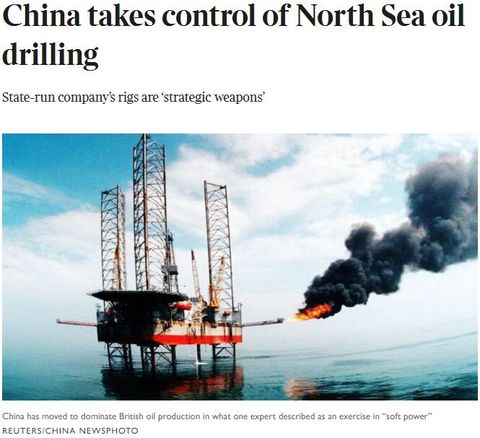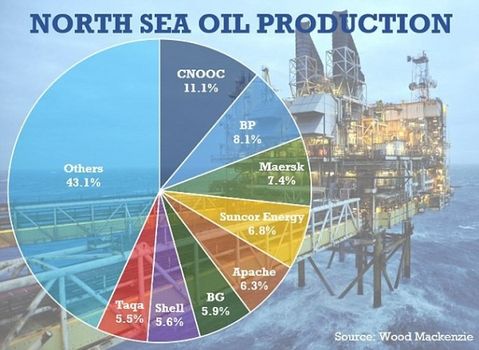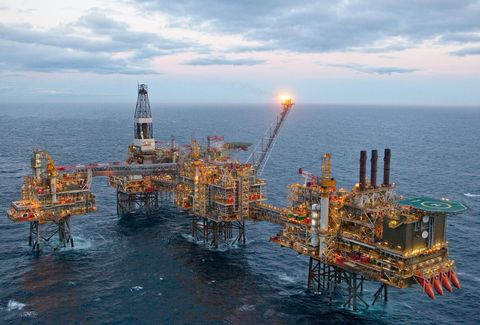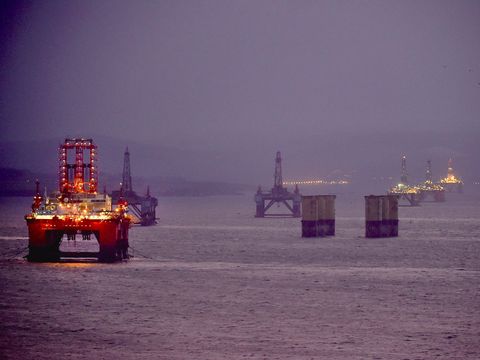"China has controlled oil exploitation in the North Sea of ​​the United Kingdom, and the deepwater drilling platform of Chinese state-owned enterprises has become a strategic weapon." On August 23, the British mainstream newspaper "The Times" published a report on the front page saying that "China has become the largest oilfield operator in the North Sea. China National Offshore Oil Corporation (CNOOC, CNOOC) operates the two largest cities in the North Sea. In the oil field, Nexen's production in the region accounts for more than 10% of its total production."

The British "Times" website reported that the screenshot report also called for vigilance against China's development in the overseas energy field. Some experts concluded that this is an example of China's use of “soft power.†The goal of the strategy is to consolidate its role as a key player in the global economy.
The Times reported that China National Offshore Oil Corporation is China's third-largest state-owned oil company, operating two of the largest oil fields in the North Sea.
CNOOC acquired Canadian Nixon Company for US$15.1 billion in 2013 and assumed approximately $4.3 billion in debt from the company. Today, Nixon produces nearly 200,000 barrels of crude oil a day in the North Sea region, accounting for more than 10% of the company's total production, thus allowing Nixon's oil production to dominate the North Sea.
The CNOOC Corporation, which controls Nixon, belongs to China’s “State-owned Assets Supervision and Administration Commission†and is “directly controlled†by the Chinese central government.
Former British Chancellor of the Exchequer George Osborne has imposed a tax exemption policy on oil companies in the North Sea, reducing the oil and gas production tax rate from 62% to 50%, so the Canadian-controlled Canadian oil giant was able to increase Scottish market share.

The major oil companies that exploited oil in the North Sea "Times" claimed that according to China's increase in the North Sea region, this means that the UK last year gave 2 billion pounds of tax relief to China's state-owned enterprises.
China National Offshore Oil Corporation’s annual report last year showed that the UK government’s tax reductions for oil production were “mainly†reflected in the taxation of £2.5 billion in 2014 and then a tax refund of £361 million in the following year.
The Times turned over the old account and said that CNOOC did not cause concern in the UK when it acquired Nixon in 2012. The newspaper believes that such a British government will only allow China's growth in the North Sea oil field to continue unimpeded. In contrast, the United States prevented CNOOC from purchasing US oil companies 10 years ago because of national security considerations. (2005 CNOOC's acquisition of US Unocal failed - Observer's Note)
According to reports, an official of CNOOC said that the deepwater drilling platform deployed will become "China Mobile's land and strategic weapons."
According to the Observer website, this allusion occurred in 2012, when the Vietnamese government opposed the decision of CNOOC to tender for a number of new oil exploration blocks. Although CNOOC regularly provides bidding for exploration in foreign countries in this area, this time it is the most representative tender of the company in the disputed waters. Wang Yilin, chairman of CNOOC, said at the time that the large-scale deepwater drilling platform was a flowing land and a strategic weapon. â€
The report also said that the international crude oil price has dropped from 115 US dollars per barrel in 2014 to the current 50 US dollars, the North Sea oil field is also increasingly depressed, but at the same time China is expanding the production activities of North Sea oil.
This has caused confusion among British experts: Why is China keen on such an investment with less obvious benefits? Some experts pointed out that China's unusual actions are an example of developing "soft power" and increasing the good impression of CNOOC by European investors and companies.
The report quoted Jeffrey Henderson, professor of international development at the University of Bristol, as saying: "The oil equipment in the North Sea oil field is aging, and the operating costs will be higher and higher for oil producers. See, overseas oil companies are injecting funds into the region, but the benefits will not be particularly obvious.†He believes that CNOOC may value Nixon’s other assets in Canada, and the growing power in the North Sea oil field may be to show “soft powerâ€. Henderson said that this may be "part of China's overall strategy to improve the legitimacy and credibility of European companies."

Not only that, but China plans to send thousands of "armies" to its first overseas "military base" in Djibouti, East Africa. Not far from the US military base in this region, this move increases the potential risk of conflict with the US military.
The report also said that China's interest in the UK's energy infrastructure has worried experts in the security field. China's influence in the North Sea oil field in the United Kingdom has gradually increased, making the outside world more controversial about the Hinkley Point C nuclear power plant.
Last month, CGN, a partner of the Hinkley Point C nuclear power plant project, was accused of nuclear espionage in the United States. Of course, the report also emphasized that CGNPC is also a state-owned enterprise that is “directly controlled†by the Chinese government.
The Hinkley Point C nuclear power plant is a nuclear power plant currently being built in Somerset County, England, in the southwest of England. According to the agreement reached between the Chinese, British and French companies and the government last year, China will invest in the nuclear power plant. However, after the new British Prime Minister Theresa May took office, the British government suddenly announced a delay in the day before the official signing of the contract in July, and decided to approve it in September.
And Teresa May’s senior aides have criticized former British Prime Minister David Cameron for over-seeking Chinese investment after 2010.
It is reported that in this project, China invested 6 billion pounds and held 33.5% of the shares. It is the largest investment by the Chinese government to the UK so far, and it has also set a precedent for China to participate in the construction of nuclear power plants in developed countries.
The Times issued an editorial call: Beijing’s interests in sensitive industries in the UK should be carefully monitored.
The editorial believes that the strategic balance of the modern world is no longer solely related to ballistic missiles, aircraft carriers and combat orders. "The ability to smash the enemy's economy, interfere with the country's energy and transportation infrastructure, and allow hostile powers to lead a few steps in future wars. So when China's large-scale acquisition policy across Europe is eyeing the North Sea, it should be vigilant. of."
According to the editorial, most Chinese companies' acquisitions have not only reflected healthy trade relations. Chinese companies recently acquired Weetabix, a UK breakfast cereal brand, a tire manufacturer in Italy and an investment bank in Portugal. “In the first half of this year, China bought 37 German companies, and no one was surprised. With the slowdown of the Chinese economy, Chinese companies are looking for opportunities in Europe and the United States.â€
The editorial pointed out that former Chancellor of the Exchequer Osborne believed that China played an important role in the long-term recovery of the 2008 international financial crisis, and that "Mei Prime is equally cautious in opening the nuclear industry to Beijing. The cautious attitude should be extended to all Chinese strategic acquisitions. At the G20 summit in Hangzhou next month, Beijing will ask the British side for the answer to the Hinkley Point nuclear power plant issue, and the first one should be patient. The Chinese criticized that safety is just to cover protection. She should resist this criticism of China."
The Times also recommended that the United Kingdom should follow the example of the United States and set up a committee to oversee all foreign investment involving national security issues.

North Sea oil rig on the English coast
Trousers refer to pants that cover the entire leg from the waist to the ankle. Generally, there are sports pants, jeans, harem pants, wide-leg pants, trousers, and the colors are more varied. The trousers should preferably have an inner lining, which not only fits well, but also hides the bloated body. Whether or not to wear a style with pleats at the trousers depends on the height and the height of the trousers. Those who are tall and thin can wear pleated trousers, but if the height is less than 162 cm, it is best not to try it lightly. Pay special attention to the smoothness of the lower part of the trousers. This is the key to the fit of the trousers. It is also the key to whether the sewing technology is excellent. A bad crotch will make the trousers sag, bulge and not fit properly.
Lady'S Trousers ,Ladies Cream Trousers,Womens Pinstripe Trousers,Lightweight Trousers Womens
NINGBO DHK IMPORT & EXPORT CO., LTD , https://www.deheke.com